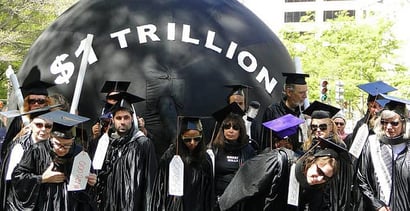

A new report published by the Institute for Policy Studies (IPS) finds student debt is rising faster at state universities with the highest-paid presidents.
In addition, these schools have higher numbers of low-wage adjunct faculty labor – meaning part-time and contingent instructors.
The report, titled “The One Percent at State U,” is the result of a study looking at the 25 public universities with the highest executive pay when compared to the nationwide four-year university average.
It examined statistics from 2006 through 2012 and found a disproportionate compensation structure for executives at the top 25 schools.
Points of interest:

National student loan debt continues to rise, registering $1.2 trillion in 2012.
• The sharpest rise in student debt levels occurred in schools where executive compensation rose the fastest.
• At state schools with the highest-paid presidents, administrative spending outpaced scholarship spending by more than two to one.
• Part-time adjunct faculty grew 22 percent faster at schools with the highest-paid presidents when compared to the national average (adjunct faculty costs the university far less).
• Executive pay at the top 25 schools increased more than twice as fast as the national average to nearly $1 million on average.
So where does your alma mater’s president rank?
| Rank | Institution | Total Compensation Awarded to Top Executive of Main Campus FY 06 — FY 12 |
Average Yearly Total Compensation in 2012 dollars FY 06 — FY 12 |
| 1 | Ohio State University | $10,223,733 | $1,533,286 |
| 2 | Pennsylvania State University | $7,658,372 | $1,134,067 |
| 3 | University of Delaware* | $7,083,950 | $1,089,663 |
| 4 | Auburn University | $6,237,411 | $925,941 |
| 5 | University of Virginia | $5,774,436 | $873,488 |
| 6 | University of Michigan | $5,659,043 | $858,333 |
| 7 | George Mason University** | $5,636,489 | $844,265 |
| 8 | University of Washington | $5,404,009 | $821,315 |
| 9 | Virginia Tech | $5,004,070 | $758,098 |
| 10 | University of Texas | $4,733,280 | $716,644 |
| 11 | University of Central Florida** | $4,712,161 | $714,369 |
| 12 | University of Minnesota | $4,425,889 | $669,874 |
| 13 | Arizona State University | $4,382,001 | $664,503 |
| 14 | University of Florida | $4,327,277 | $656,238 |
| 15 | Temple University | $4,302,599 | $651,943 |
| 16 | Washington state University | $4,301,950 | $652,655 |
| 17 | Rutgers University | $4,289,298 | $653,821 |
| 18 | University of Kentucky | $4,284,203 | $647,349 |
| 19 | University of Houston | $4,273,040 | $648,216 |
| 20 | Georgia State University | $4,199,291 | $641,036 |
| 21 | Pittsburgh University | $4,136,562 | $628,210 |
| 22 | Georgia Institute of Technology | $4,116,997 | $625,918 |
| 23 | University of Georgia | $4,088,151 | $620,958 |
| 24 | University of Connecticut | $3,925,372 | $595,586 |
| 25 | Florida State University | $3,694,233 | $561,876 |
According to The Institute for College Access and Success (TICAS), student loan debt reached $1.2 trillion in 2012, overtaking total credit card debt for the first time in history.
And with part-time adjunct faculty at universities making an average annual wage of just more than $22,000 per year, we know the increasing costs aren’t going to them.
So one has to ask — are university professors worth the salaries they receive?
*FY 2009 compensation was unreported. Total compensation for FY 06 – FY 12 reflects an FY 09 estimate based on the yearly average of total compensation reported for Patrick Harker in FY 08, FY 10, FY 11, and FY 12.
**FY 2006 compensation was unreported. Total compensation for FY 06 — FY 12 reflects an FY 06 estimate based on average of 23 other top 25 compensation figures for FY 06. Given subsequent year totals at this institution, the FY 06 — FY 12 total is likely an underestimate.
Photo credits: Flickr/Backbone Campaign; credit.com
Advertiser Disclosure
BadCredit.org is a free online resource that offers valuable content and comparison services to users. To keep this resource 100% free for users, we receive advertising compensation from the financial products listed on this page. Along with key review factors, this compensation may impact how and where products appear on the page (including, for example, the order in which they appear). BadCredit.org does not include listings for all financial products.
Our Editorial Review Policy
Our site is committed to publishing independent, accurate content guided by strict editorial guidelines. Before articles and reviews are published on our site, they undergo a thorough review process performed by a team of independent editors and subject-matter experts to ensure the content’s accuracy, timeliness, and impartiality. Our editorial team is separate and independent of our site’s advertisers, and the opinions they express on our site are their own. To read more about our team members and their editorial backgrounds, please visit our site’s About page.




